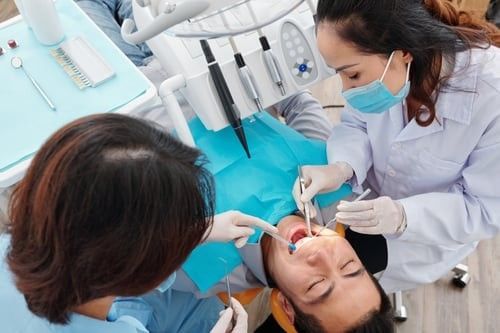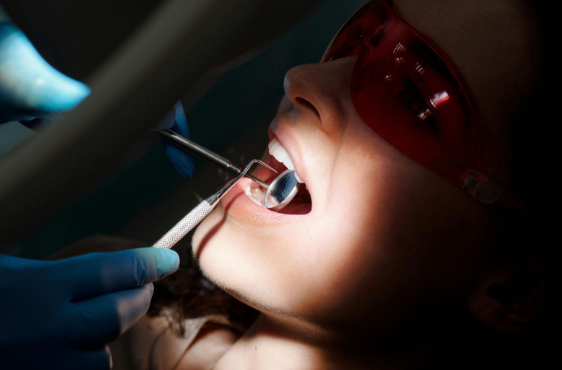Gateway Family Dental Blog
The Health Risk of Missing Teeth

Tooth loss is a prevalent issue affecting people of all ages, with significant implications for oral and overall health. Learning the reasons for missing teeth, the health consequences, and available treatment options can help individuals maintain optimal health and well-being.
Reasons for Missing Teeth
Tooth loss can occur for several reasons:
- Genetic Conditions: Some people are born with conditions that affect the development of their teeth, leading to gaps or missing teeth.
- Poor Dental Hygiene: Not brushing and flossing regularly can lead to cavities and gum disease, which can cause tooth loss.
- Periodontitis: This severe infection damages the soft gum tissue and can destroy the bone that supports your teeth, leading to tooth loss.
- Traumatic Injuries: Accidents or injuries to the mouth can knock out teeth or damage them to the point that they need to be removed.
- Tooth Decay: Severe cavities can damage a tooth beyond repair, sometimes requiring extraction.
Health Consequences of Missing Teeth
Missing teeth affect more than just your smile; they can lead to serious health issues. Let us explore the health consequences of missing teeth and why proper dental care is necessary:
Crooked Teeth and Bite Misalignment
Missing teeth can cause neighboring teeth to shift into the gap, resulting in bite misalignment. This misalignment can cause issues with chewing, speaking, and even breathing. It can also cause wear and tear on the remaining teeth, worsening dental issues.
Gum Recession and Gum Disease
The absence of teeth can lead to gum recession and increased susceptibility to gum disease. Gaps in the gums can become breeding grounds for bacteria, leading to infections and inflammation. Over time, this can result in further tooth loss and other oral health complications.
Bone Loss in the Jaw
Teeth play a significant role in maintaining the jawbone's integrity. The roots of teeth stimulate the jawbone during chewing and speaking. Without this stimulation, the jawbone can deteriorate, leading to bone loss. This can affect the shape of the face and lead to further oral health issues.
Difficulty Eating and Speaking
Tooth loss can significantly impact a person’s eating and speaking ability. Missing teeth can make it difficult to chew food thoroughly, leading to digestive issues. Speech can also be affected, as teeth help us to articulate certain sounds.
Increased Risk of Systemic Diseases
Periodontitis has been associated with systemic diseases like cardiovascular disease, diabetes, and respiratory infections. Missing teeth and poor oral health can increase the risk of these conditions by allowing harmful bacteria to enter the bloodstream.
Nutritional Deficiency
Difficulty chewing can restrict your diet, making it hard to eat foods like fruits, vegetables, and certain meats important for nutrition. This can result in nutritional deficiencies, impacting overall health and well-being.
Decreased Self-Confidence
Teeth loss can have an extensive psychological effect. Many individuals experience decreased self-esteem and confidence, which affects their social interactions and mental health.
Treatment Options for Missing Teeth
Here are the treatment options available for missing teeth:
Removable Dentures
Removable dentures are a standard solution for replacing missing teeth. Depending on the extent of tooth loss, they can be partial or complete. Modern dentures are designed to fit comfortably and look natural, restoring functionality and aesthetics. Regular adjustments and proper care are necessary to maintain their effectiveness.
Implant-Supported Dentures
Implant-supported dentures provide a more stable and secure solution than conventional dentures. Dental implants give dentures a strong base by surgically inserting them into the jawbone. This option helps preserve the jawbone and provides better comfort and functionality.
Dental Bridges
A dental bridge consists of one or more artificial teeth anchored to the adjacent natural teeth. This option is suitable for individuals missing one or a few teeth. Bridges help maintain the alignment of remaining teeth and restore the ability to chew and speak properly.
Dental Implants
Titanium rods used in dental implants are inserted into the jawbone by surgery. They serve as anchors for replacement teeth or crowns. Implants look and function like natural teeth and help prevent bone loss by stimulating the jawbone.
Non-Surgical Gum Rejuvenation
Non-surgical gum rejuvenation can be effective for individuals with gum recession and periodontal disease. This procedure involves scaling and root planing to remove plaque and tartar, followed by treatments to promote gum tissue regeneration.
Bone Grafting
In cases of significant bone loss, bone grafting may be necessary to rebuild the jawbone before dental implants can be placed. During this process, bone tissue is transplanted to the damaged area to promote the growth of new bone and create a solid implant foundation.
Orthodontic Treatments
Orthodontic treatments, such as braces or clear aligners, can help correct bite misalignment and prevent further dental issues caused by shifting teeth. These treatments are often used in conjunction with other tooth replacement options to ensure optimal results.
For personalized advice and treatment options for missing teeth, consult with our team at
Gateway Family Dentistry.
Contact us to learn more.




